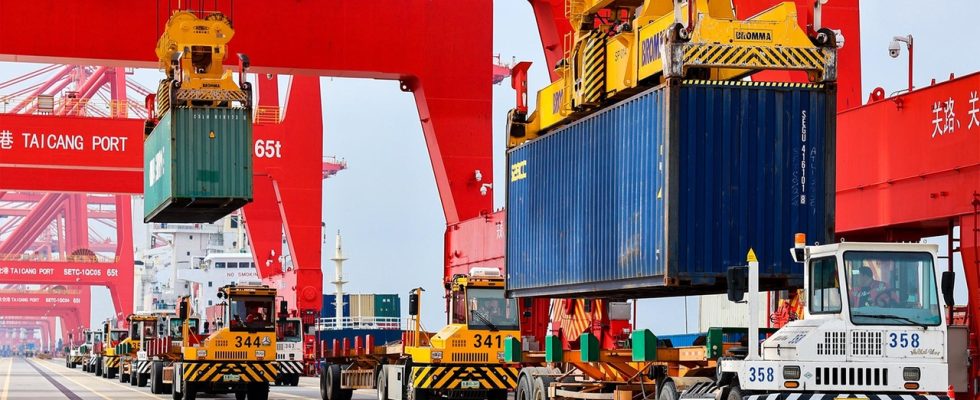background
In recent years, Germany’s trade relations with China have become even closer. The consequences are economic dependencies that many experts consider dangerous.
There has been a lot of talk in recent years about the risks of Germany’s close economic ties with China. In view of the increasing geopolitical tensions, this discussion has recently intensified. In fact, the dependence of the German economy on the People’s Republic has increased even further in recent years.
Measured by the total trade volume, i.e. exports and imports together, China has risen to become Germany’s most important trading partner since 2016. According to the Federal Statistical Office, the mutual exchange of goods reached almost 299 billion euros last year. That was more than doubling in ten years. In 2012, the trading volume was still 145 billion euros.
Looking at the export side, 9.8 percent of all exports went to China, making the country the second largest buyer of German goods after the USA.
While trade with China has grown almost steadily even during the corona pandemic, the growing trade deficit, which has recently widened to a record value of around 85 billion euros, is striking. In view of the German economy’s notorious trade surplus, this deficit is not harmful overall. However, it shows that Germany has relied more heavily than ever on imports from the People’s Republic and that the dependencies on the import side are even greater than on the export side.
Auto industry extremely dependent on the Chinese market
Mainly thanks to the demand from China, automobiles are Germany’s most important export good. Automobiles and automobile parts accounted for over a quarter of exports to the People’s Republic in 2021. Electronic components and other machines follow at a considerable distance.
The vulnerability of German automotive and mechanical engineering is obvious. Should there be any lasting disruption to trade with China, the consequences for profit development and employment in these key sectors would be enormous. The growing domestic competition is already causing increasing concern for German manufacturers. Especially in the future field of e-mobility, German manufacturers have fallen behind.
High dependency on electronic devices
But the import side of the German trade balance in particular shows that China has been able to benefit significantly from the globalization trend of recent years with its internationalization of supplier relationships. The value of the computers and other data processing equipment imported from China alone exceeds that of German automobile exports.
The increasing security concerns, particularly in the case of network technologies, cannot yet be read from these figures. Measured by the value of the goods, according to the Federal Statistical Office, around 86 percent of the imported notebooks and tablets and around 68 percent of the smartphones and telephones came from China in the first quarter of 2023.
While failures in Chinese toy or furniture imports would be comparatively easy to replace, the substitution of the electrical appliances and electronic components imported in large numbers poses considerable problems for German companies. It is not only the costs that are an important factor here, but also the required volumes.
Risky dependency on raw materials
An increasingly critical field that China has been strategically ordering for years is raw materials and raw material-based components for the major future fields of e-mobility and renewable energies. In the case of rare earths, which are indispensable for the construction of high-tech components, for example in the field of renewable energies, import dependency was 92 percent.
Experts are just as critical of the lithium situation, which is needed in particular for batteries in electric vehicles. In the global race for the coveted light metal, China is clearly ahead. Chinese companies are investing billions in countries in Latin America and Africa to secure deposits. According to experts, China could control around a third of the world’s lithium supply by 2025. At the end of March, Commission President Ursula von der Leyen warned that the EU gets 97 percent of its lithium from China. In addition, around 39 percent of all lithium-ion batteries required in Germany came from China in the first quarter.
“The dependence on China for lithium is a major risk for German companies,” says economic researcher Tobias Heidland from the Kiel IfW. “Should major tensions arise, they could lose access to crucial intermediates.”
“De-risking” instead of decoupling?
But what can be done to reduce dependence on the world export champion? It is clear that a “decoupling”, which has recently been heard more frequently, is hardly realistic and is in the interest of no one involved. Even the recently completed severing of key trade relations with Russia gives an idea of the problems and costs that would be associated with similar steps towards China. According to a study by the Munich ifo Institute, “reshoring”, ie moving production back to Germany, would lead to a decline in gross domestic product (GDP) of around 9.7 percent. China, on the other hand, would only suffer a loss of 0.17 percent.
A more pragmatic approach, followed by politicians and parts of the economy, is to reduce risks. Instead of decoupling, “de-risking” is necessary to reduce dependencies, said Siegfried Russwurm, President of the German industry association BDI. “The companies are in the process of strategically diversifying their sales and procurement markets and establishing new partnerships.”
However, it remains controversial whether such initiatives can really reduce the risks in the long term. The Chinese sales market and the profits to be expected there appeared “simply too attractive” to consider turning away, according to a study by the Institute of German Economics (IW) in Cologne.

